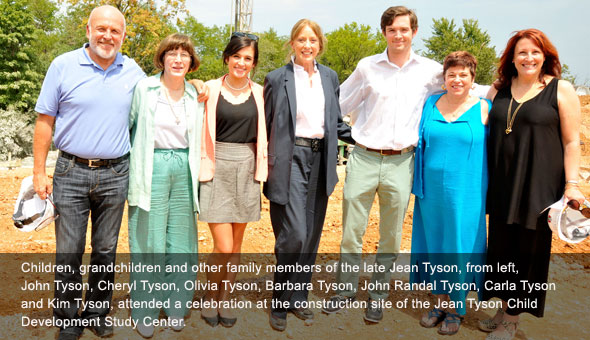The Tyson Family
U of A honors donors at Jean Tyson Child Development Study Center construction celebration
Original press release from JTCDSC construction ceremony held Aug. 23, 2011
John H. Tyson, Tyson Foods board chairman, speaking at a construction celebration for the Jean Tyson Child Development Study Center Tuesday, Aug. 23, 2011, said, “Our mother, and my children’s grandmother, believed strongly in providing young children the very best environment humanly possible to be raised in and educated. She certainly did that for our family.”
Tyson, who is also a member of the University of Arkansas System's Board of Trustees,
speaking for his sisters, his children and other family members who attended the event,
said, “We are pleased to be able to support this great project that will enable the
same thing to be done for many other Northwest Arkansas families, and for students
to be educated and enabled to do this in ever widening circles across the state of
Arkansas. Our family and our company are honored to lend her name to the effort.”
That was the motivation for a $2.5 million lead gift from the Tyson Family Foundation and the Tyson Foods Foundation for the center, which will provide care for more than 140 children. It will also be a learning laboratory for students studying child development in the university's School of Human Environmental Sciences, which is part of Dale Bumpers College of Agricultural, Food and Life Sciences.
The 22,800-square-foot facility is under construction at the intersection of Douglas and Oakland on the north side of the campus.
Chancellor G. David Gearhart and Bumpers College Dean Michael E. Vayda also thanked Mark and Joe Rumsey of the Zero Mountain cold storage company and Aaron Brown of the A.L Chilton Foundation for gifts of $500,000 and $75,000, respectively. Additional donations are being solicited for the project.
Currently, the campus offers an Infant Development Center and a Nursery School through the School of Human Environmental Sciences. Both provide child care and serve as learning laboratories for students who study child development, nursing and early childhood education.
Child development program coordinator Vernoice Baldwin said both facilities, while able to attain national accreditation from the National Association for the Education of Young Children, are inadequate. The Nursery School faces severe space limitations. The Infant Development Center, constructed for a completely different purpose in the early 1970s, has been maintained solely as a temporary facility, has space issues and cannot continue to meet health and safety regulations without extensive renovation. The reality that these two centers are on opposite sides of campus presents further logistical and practical challenges for students, faculty and clients as well.
Baldwin said the center, with classrooms, indoor and outdoor play spaces and an adequate observation room, will help students gain valuable insight into the behavioral and developmental patterns in children.
“This project provides multiple benefits that will enhance the university’s academic quality and its ability to support our students and employees,” said Gearhart. “Once completed, the Jean Tyson Center will be a great learning resource for faculty and students studying child development. At the same time, the center will address our campus community’s need for high-quality childcare options.
“This addition to the university would not be possible without the generous support of Jean Tyson’s family," Gearhart continued. “The Tysons’ commitment to this particular educational endeavor has inspired others to step forward in significant and meaningful ways. We are extremely grateful to the Tyson family and our other supporters for making this center possible.”
Mark Rumsey, Zero Mountain president and chief executive officer, said at the time of the company's gift announcement that John Tyson’s grandfather inspired Rumsey’s father to not give up on “the Zero Mountain dream. It is our corporate belief that the private sector, by donations such as these, can make huge differences to the communities we invest in. Investing money in our institutions of higher learning and addressing quality of life issues such as the arts enhance our quality of place as well as creating a setting to retain those whom we educate here in Arkansas.”